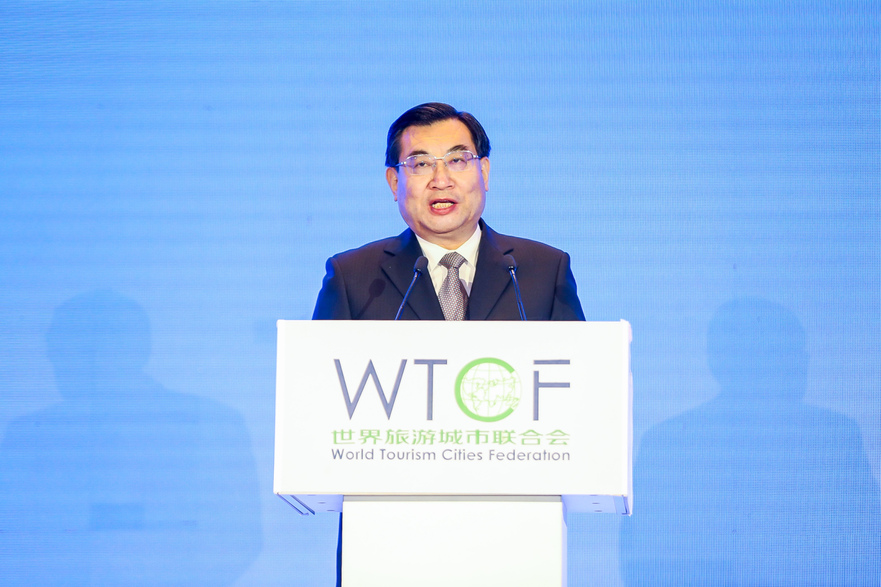
Hu Heping, Minister of Culture and Tourism of China delivers a speech
As one of the four summit forums to be held during 2020 China International Fair for Trade in Services (CIFTIS), the World Conference on Tourism Cooperation and Development hosted by the World Tourism Cities Federation (WTCF) was held at China National Convention Center on September 5th. The theme of this conference is "Rebuilding World Tourism for Prosperity". Hu Heping, Minister of Culture and Tourism of China, attended the opening ceremony and delivered a speech. He said that this conference studied and discussed the development of world tourism amid the COVID-19, which fully demonstrated the firm determination of the world tourism industry to unite and overcome difficulties. It will assemble global wisdom, experience, power, and promote the restoration, revitalization and prosperity of the sector. China is willing to deepen cooperation and share its experience with other countries to jointly promote the success and development of the industry.
The COVID-19 pandemic is the most serious global public health emergency since the end of the Second World War. It poses an unprecedented threat to human life and safety, has had a huge impact on the world economy, and has severely tested the governance capabilities of countries. The Chinese government has attached great importance to pandemic control and prevention. President Xi Jinping has personally directed and deployed the campaign, while citizens of the whole country have united as one to do their part. The Chinese government has adopted the most comprehensive, thorough and strictest prevention and control measures. Additionally, the government has promptly introduced effective policies, so as to promote the coordinated prevention and control of the epidemic as well as economic and social development.
In this process, the Ministry of Culture and Tourism, under the unified leadership of the central government, has taken practical measures for epidemic prevention and control, and steadily promoted the resumption of work and production, which not only effectively prevented the spread of the epidemic through tourism activities, but also promoted the recovery and development of the tourism industry.
In his speech, Hu Heping shared China's main practices to promote the recovery and development of the tourism industry while preventing and controlling the epidemic. Hu Heping said:“First, we always put the safety of the people at the forefront. After the outbreak, we immediately closed tourist attractions, stopped travel agency group activities, actively coordinated the return trips of outbound tourists, and issued overseas travel reminders to effectively prevent the risk of COVID-19 in the tourism field. Second, we did our best to help tourism companies and practitioners get through this difficulty. In response to those difficulties in the tourism industry, we have launched a series of relief measures, such as the temporary refund of the tourism service quality deposit, the coordinated solution of ticket refunds, the introduction of financial support, fee and tax reduction policies, protection of the labor rights of tour guides, and stabilizing tour guide teams, in an effort to minimize the losses caused by the epidemic. Third, we have resumed tourism operations actively and steadily. We adhere to the principle of zoning and grading, publishing work guides, launching appointment services, limiting traffic in scenic spots, advocating staggered travel, and steadily promoting the reopening of tourist attractions, tourist hotels, and the resumption of tourist agencies. At the same time, we have taken measures such as lowering ticket prices, issuing consumption coupons and increasing tourism publicity, so as to stimulate consumption and restore the confidence of the industry and tourists. Fourth, we have planned to promote a safer a more developed industry after the epidemic. While effectively responding to the epidemic, we have carried out large-scale free online training, implemented digital upgrading projects for cultural and tourism enterprises, vigorously promoted smart tourism, strengthened tourism market management and industry regulation, and continuously promoted further growth."
Tourism, one of the largest industries in the world, is a pillar industry of the national economy in many countries. It plays an irreplaceable role in promoting economic and social development and enhancing people's sense of happiness. Tourism is also an industry that is highly sensitive to the external environment, so it is also one of the industries most seriously affected by the epidemic. According to the Organization for Economic Co-operation and Development , international tourism revenue will fall by 60%-80% in 2020; according to the World Tourism Organization, global tourism output will fall by 70% in 2020. In this situation, it is particularly important to restart tourism and recreate prosperity.
According to Hu Heping, the three pivotal parties which consists of governments, enterprises, and tourists should jointly promote the revitalization of the tourism industry. "Governments of all countries should strengthen top-level designs, coordinate the use of resources from various departments, and launch comprehensive measures to help tourism companies overcome difficulties. As the core force of the tourism industry, enterprises should focus on strengthening their capacity, seeking better development modules, researching new products, exploring new models, making good use of new technologies such as 5G, big data, cloud computing and artificial intelligence, developing smart tourism, promoting scheduled, limited, staggered trips, and improving the quality of tourism development. Chinese and foreign tourists should prioritize their safety, environmental protection and display good etiquette while traveling. With a great sense of responsibility, they can have better travel experiences."
Hu Heping pointed out that responding to the impact of the epidemic and promoting tourism recovery requires the global tourism industry to unite and form a joint force. He hoped that various international organizations in the field can continue to build exchangeable and cooperative platforms, and governments, tourism authorities, industry associations, companies, experts and scholars from all over the world can discuss developmental plans to jointly promote the revitalization and prosperity of world tourism.
Copyright ©1997- by CRI Online All rights reserved